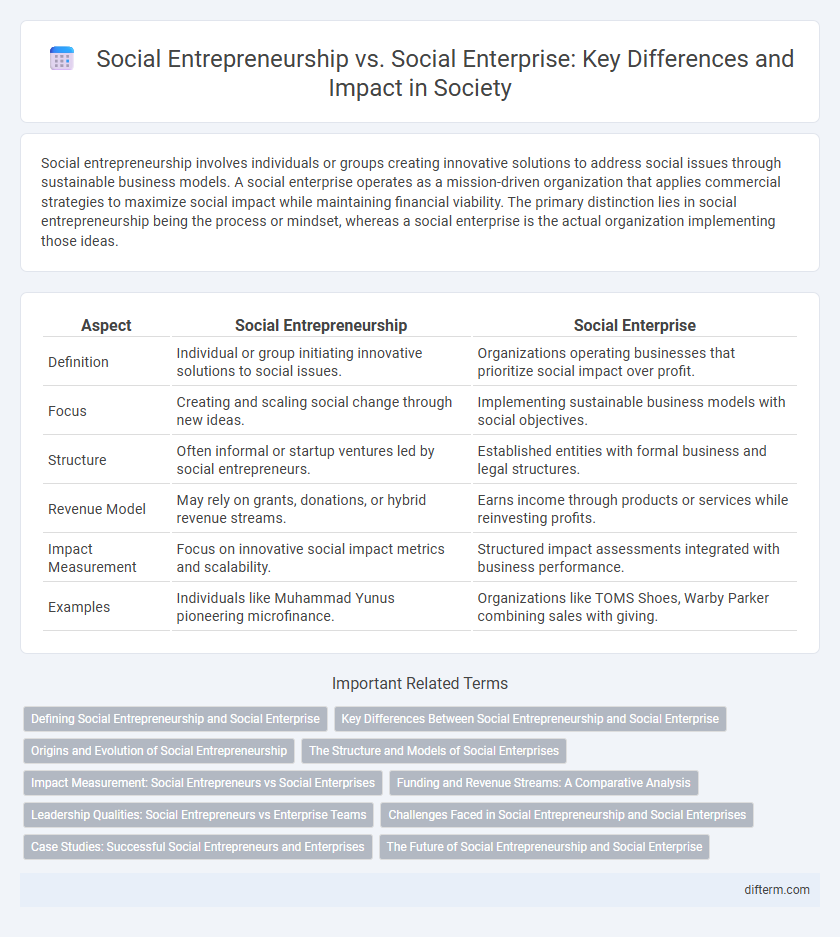Social entrepreneurship involves individuals or groups creating innovative solutions to address social issues through sustainable business models. A social enterprise operates as a mission-driven organization that applies commercial strategies to maximize social impact while maintaining financial viability. The primary distinction lies in social entrepreneurship being the process or mindset, whereas a social enterprise is the actual organization implementing those ideas.
Table of Comparison
| Aspect | Social Entrepreneurship | Social Enterprise |
|---|---|---|
| Definition | Individual or group initiating innovative solutions to social issues. | Organizations operating businesses that prioritize social impact over profit. |
| Focus | Creating and scaling social change through new ideas. | Implementing sustainable business models with social objectives. |
| Structure | Often informal or startup ventures led by social entrepreneurs. | Established entities with formal business and legal structures. |
| Revenue Model | May rely on grants, donations, or hybrid revenue streams. | Earns income through products or services while reinvesting profits. |
| Impact Measurement | Focus on innovative social impact metrics and scalability. | Structured impact assessments integrated with business performance. |
| Examples | Individuals like Muhammad Yunus pioneering microfinance. | Organizations like TOMS Shoes, Warby Parker combining sales with giving. |
Defining Social Entrepreneurship and Social Enterprise
Social entrepreneurship involves identifying and implementing innovative solutions to address social issues while prioritizing social impact over profit. A social enterprise is an organization that operates commercially but reinvests its profits to achieve social, environmental, or community goals. Both concepts emphasize creating sustainable change, yet social entrepreneurship focuses on the individual or process, whereas social enterprise refers to the structured business entity driving that change.
Key Differences Between Social Entrepreneurship and Social Enterprise
Social entrepreneurship refers to the process of identifying innovative solutions to social problems through entrepreneurial principles, while a social enterprise is an organization that implements these solutions with a business model focused on social impact. Key differences include that social entrepreneurship emphasizes the mindset and activities of creating social value, often through startups or projects, whereas social enterprises are established entities sustaining their mission through revenue-generating operations. Social entrepreneurship is dynamic and project-based, whereas social enterprises provide ongoing goods or services with measurable social outcomes.
Origins and Evolution of Social Entrepreneurship
Social entrepreneurship originated in the 1980s as a response to mounting social challenges, combining innovative business principles with a mission for social impact. Over time, it evolved from individual ventures to a global movement fostering sustainable solutions and scalable social innovations. This evolution contrasts with social enterprises, which are more structured organizations that directly operate businesses with social objectives embedded in their core missions.
The Structure and Models of Social Enterprises
Social enterprises often adopt hybrid business models combining profit-driven strategies with social missions, leveraging structures such as cooperatives, nonprofit subsidiaries, and benefit corporations to maximize impact. These organizations balance revenue generation with social value creation, using models like the cross-subsidy approach, where profitable activities fund community-oriented services. The governance framework typically includes stakeholders from both business and social sectors, ensuring accountability and sustainability in achieving social objectives.
Impact Measurement: Social Entrepreneurs vs Social Enterprises
Social entrepreneurs emphasize innovative approaches and personal leadership to create systemic social change, measuring impact through qualitative narratives and long-term community transformation. Social enterprises prioritize scalable, sustainable business models with quantifiable metrics such as social return on investment (SROI) and impact dashboards to assess financial and social outcomes. Both approaches value impact measurement but differ in methodology--social entrepreneurs often focus on emergent, adaptive indicators, while social enterprises rely on standardized performance indicators to demonstrate effectiveness and growth.
Funding and Revenue Streams: A Comparative Analysis
Social entrepreneurship often relies on diverse funding sources such as grants, impact investments, and crowdfunding to launch innovative solutions addressing social issues. In contrast, social enterprises typically generate sustainable revenue streams through the sale of goods or services linked directly to their social mission, ensuring long-term financial viability. Comparing these models highlights how social entrepreneurship prioritizes initial capital acquisition for innovation, while social enterprises focus on balancing profit generation with social impact.
Leadership Qualities: Social Entrepreneurs vs Enterprise Teams
Social entrepreneurs exhibit visionary leadership, driving innovation and inspiring change through proactive problem-solving and resilience. In contrast, social enterprise teams emphasize collaborative leadership, focusing on operational efficiency, stakeholder engagement, and sustainable impact management. Both approaches require adaptability, ethical decision-making, and a deep commitment to social mission, but entrepreneurs prioritize transformative vision while enterprise teams excel in structured execution.
Challenges Faced in Social Entrepreneurship and Social Enterprises
Social entrepreneurship faces challenges like securing consistent funding, balancing profit with social impact, and scaling innovative solutions while maintaining core values. Social enterprises struggle with market competition, regulatory compliance, and measuring social outcomes alongside financial performance. Both require adaptive leadership and robust stakeholder engagement to overcome obstacles and sustain impact.
Case Studies: Successful Social Entrepreneurs and Enterprises
Case studies of successful social entrepreneurs like Muhammad Yunus, founder of Grameen Bank, demonstrate how innovative microfinance solutions can alleviate poverty while generating sustainable impact. Social enterprises such as TOMS Shoes showcase a business model blending profitability with social missions, donating a pair of shoes for every pair sold to improve health and education globally. These examples highlight diverse approaches to addressing social issues through entrepreneurial strategies that balance financial viability with meaningful community benefits.
The Future of Social Entrepreneurship and Social Enterprise
The future of social entrepreneurship and social enterprise centers on scalable innovation and sustainable impact, leveraging technology and data-driven solutions to address complex social challenges. Emerging trends highlight increased collaboration between social entrepreneurs, investors, and policymakers to expand social value creation globally. Growing emphasis on measurable outcomes and hybrid business models will drive the evolution of socially conscious enterprises in the next decade.
social entrepreneurship vs social enterprise Infographic

 difterm.com
difterm.com